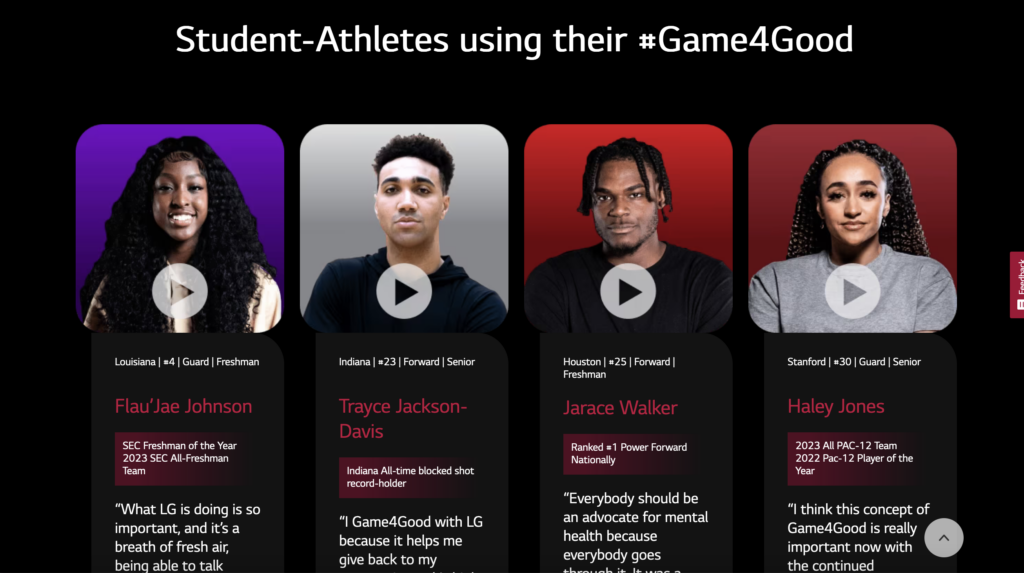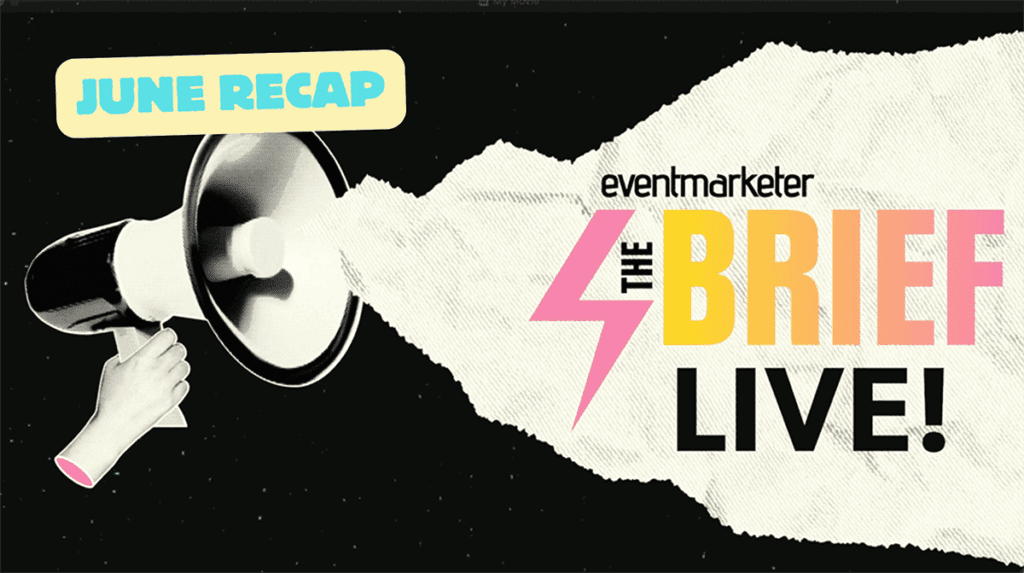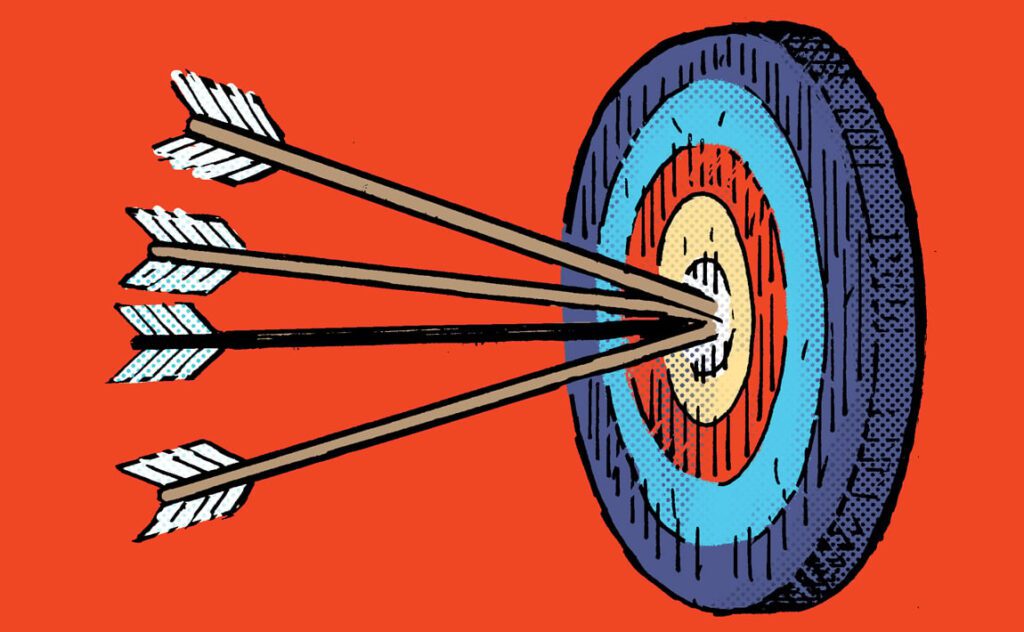The detrimental effects caused by years of pandemic-related quarantines and subsequent social isolation—a phenomenon experienced in solitude and yet shared globally—has shed new light on the importance of mental health and wellness practices. And naturally, that cultural shift has permeated marketing campaigns, even in cases where a brand’s connection to mental health issues isn’t endemic.
Among them is LG’s video series “Game 4 Good,” a partnership with NCAA’s March Madness college basketball tournament that elevates and supports the work of four student athletes committed to mental health and wellness causes.
“During the pandemic, we saw that there was an increased need for mental health support and awareness among college students, but especially among college student athletes,” according to Jeannie Lee, Director of Corporate Brand Marketing at LG Electronics. “One of the things that’s really important for us, as we work around mental health, wellness and mindfulness, is that LG doesn’t ever come to the table as an expert on mental health, per se.”
The goal, rather, is to help the athletes tell their own stories. “What we can do,” she continued, “is use our resources to provide space for dialogues to happen, to provide a platform for various initiatives that can help break down some of the stigma around mental health.” Following is an excerpt of our conversation with Lee about the Game 4 Good series, its connection to LG’s broader “Love the Game” platform, and how the brand is tapping new channels to spread the word.
Chief Marketer: How did the idea for the Game 4 Good series come about?
Jeannie Lee, Director of Corporate Brand Marketing at LG: Game 4 Good is something we launched specifically for March Madness, and “Love the Game” is our partnership as a whole. That can be interpreted in various ways, whether it’s from the student athlete perspective, the communities, the teams or fans’ love of the game. We wanted to show up in a way that was consistent with some of the other work that we were doing.
We partnered with some of the student athletes playing in the March Madness tournaments to highlight the importance of mental health and wellness from their own perspective, so that they can share their work around it as well as be a voice among their peers. One of the things that’s really important for us, as we work around mental health, wellness and mindfulness, is that LG doesn’t ever come to the table as an expert on mental health, per se. What we can do is use our resources to provide space for dialogues to happen, to provide a platform for various initiatives that can help break down some of the stigma around mental health.
CM: How did you choose the student athletes?
JL: They have already been active their support and raising awareness for mental health. It was important for us to partner with student athletes who are already doing the work in this space so that we can bring an authentic voice. Part of that is they’re helping us provide a message of support for their teammates and their peers who are competing during this time of intense pressure. We worked with them to select four charities so that we can make donations and help them do more of the work that they’re doing in this space.
CM: How long has LG been working on health and wellness programs?
JL: It’s not something new for LG. Our previous CSR initiative was called “Experience Happiness,” and it was around mental health wellness, the science of happiness and how to tap into that. It was focused on a younger audience—high school and middle school students. That initiative exceeded the goals that it set out to do, so we connected all the different dots and refocused. During the pandemic, we saw that there was an increased need for mental health support and awareness among college students, but especially among college student athletes. So that’s where we’ve shifted our focus.
CM: How does experiential factor into the program?
JL: Experiential is a big part of the NCAA partnership, because March Madness and the Final Four are tentpole events. We will be activating at the Final Four, both men’s and women’s. It will highlight some of our home entertainment and appliance products and initiatives. Another part of the experiential marketing during Final Four is an extension of Game 4 Good. We’ll be doing an episode of our “Transparent Conversations” podcast with the student athletes. It’s a live-to-tape podcast hosted by Prim Siripipat, a former D1 Duke tennis player and former sports reporter with ESPN. She’s very active in the sports world, but her focus now is also around athlete mental health. We launched it last year during the fall, and its goal is similar. LG doesn’t necessarily want to come across as an expert in mental health, but what we can do is power platforms that allow for dialogues to happen and increase awareness.
CM: What other marketing channels are you tapping for this partnership?
JL: It’s provided a way for us to do things in new channels. We’re partnering with the NCAA and Warner Brothers Discovery Sports on creating a NCAA Championships channel available exclusively on LG Smart TVs. We launched an original content series called “The Rivalries.” Fans get really passionate about rivalries, even people who aren’t necessarily diehard sports fans. A lot of people know the big sports ones, like Duke and UNC or UCLA and USC, but there’s also a lot of excitement and intensity around unknown rivalries. This content series highlights those in the Division 2 and Division 3 schools. So we’re trying to get into new territories, with podcasts and original content. That’s something that’s new for us and it’s working well.



 Network
Network

